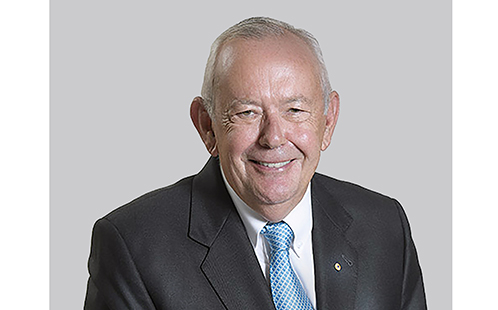Opinion: Les Murray said his autism shaped his poetry – his late poems offer insights into his creative process
The following opinion piece authored by PhD candidate Amanda Tink from the Writing and Society Research Centre was first published with full links on The Conversation (opens in a new window).
An autistic author recently tweeted:
I filled out an autism quotient questionnaire for my upcoming assessment and one of the questions was about if I am fascinated by dates and I said no BUT now I want to go to the supermarket and buy some dates and see how fascinating they really are.
Reading this, I decided that a personal reevaluation of dates was definitely in order, despite our previous incompatibilities.
For me, the first hurdle in even tolerating any food is the physical experience of eating it – its initial combination of textures, and how they change during the eating process. Like Les Murray’s son Alexander, I hated “orange juice with bits in it” throughout my childhood. I still dislike the bits, but I have learned to endure them for the taste, which is my process for at least half of what I eat.
My memory of the taste of dates when I tried them as a child is sugary dirt, so they were never worth their gluey gelatinousness. But perhaps they, or I, would be different now. Intrigued by this idea, I sent the “dates” tweet to my partner, who describes himself as “having more than a hint of neuroatypicality”. He replied that he had always thought that that question referred to going out to a romantic dinner.
Of course, the non-autistic designers of the autism quotient test intended “dates” to refer only to the day, month and year of an event.
Autism and detail
These differences in word association are one reason that Les Murray identified autism as “the part of my brain […] which is mostly the part my poetry comes from”.
They also emphasise the role of context in interpretation. Though being autistic enabled the intimate relationship with detail and uncommon relationship with the world that are characteristic of Murray’s poetry, his autism often went unacknowledged when his poetry was interpreted.
Having explored the influences of autism in Murray’s poetry for a number of years, I was intrigued that autism and recontextualisation were of particular interest to him in his final collection Continuous Creation, where they often intertwine.
While Murray explicitly foregrounds his autism, some of his intentions regarding context are unclear. One example of this uncertainty is the poem Cherry Soldiers, which appears at the halfway point of the book. Here it is, in its two-line entirety:
Chokecherry, chokecherry, makin a stand:
I got your little pokeberry eatin from my hand.
Caroline Overington labels this poem “fun”, which may well be the experience Murray intended it to convey as a singular poem in this collection. For me, however, it evokes the unease that I feel whenever I read it in Fredy Neptune.
Fredy Neptune was Murray’s second verse novel, published in 1998. It is the self-narrated story of an autistic German-Australian man named Fredy Boettcher.
Near the beginning of the novel, Fredy witnesses a mass murder that is part of the Armenian genocide, after which he acquires an impairment which includes the absence of physical sensation. Over the course of the novel, he develops an understanding of his impairments and negotiates others’ prejudices against him, in the midst of some key events in the first half of the 20th century.
The two lines of the poem Cherry Soldiers appear ten pages from the end of the novel. Fredy has settled in Australia with his wife, their adult son, and Hans, who is also autistic, and whom Fredy has adopted as his brother. In what I think of as a signal to anyone who has registered Fredy’s and Hans’s autism, they are at a train station, alleviating their stress by watching the trains arrive and depart.
They are separated by a group of American soldiers, one of whom draws Fredy into a conversation about names, while the rest begin teaching Hans to play poker. The reader is unsure what will occur next, until the captain of the troop returns and calls them to order. The soldiers sing “Chokecherry, chokecherry, makin’ a stand: / I got your little pokeberry eatin’ from my hand” as they leave.
Fredy finishes this story by noting his mixed emotions regarding this song: “Lord knows what that meant; but I still sing it sometimes.”
The importance of context
The role of context is similarly both significant and mysterious for the poems School Bus Home and The Invention of Pigs. In his review of Continuous Creation, David McCooey cites these poems as new material and presents them as examples of Murray’s “inconsequential writing” and “love of the sonic nature of poetry”.
While I agree with McCooey about these perennial qualities of Murray’s writing, the two poems are not new writing, if you take “new” to mean not previously in existence. If you take new to mean not previously in this form, then they might be evidence of Murray’s skill at rearranging, because earlier versions of them appear in his book On Bunyah (2015).
The three stanzas of School Bus that appear in On Bunyah have been re-ordered, transposed from past to present tense, and supplemented with two additional stanzas to become School Bus Home in Continuous Creation.
The Invention of Pigs, which describes a bushfire moving through Bunyah, has the same title in both books, but there are alterations in all four stanzas that change the scope of the poem. For example, in On Bunyah, stanza three reads:
too swift to ignite any houses.
One horse baked in a tin shed.
After, a few pigs lay smoke-dead
but where flames had leaned in on
Whereas, in Continuous Creation, the pigs, even though they are named as the poem’s topic in the title, are deleted in favour of chickens:
too swift to ignite any houses.
One horse baked in a tin shed,
naked poultry lay about dead
having been plucked in mid flight
These are two of the three rearrangements of previous poems that I am aware of in Continuous Creation. The third has alterations similar to those in The Invention of Pigs and, like School Bus home, is told from a different perspective. The Scores, 20th Century was first published as The Scores in 2002. It is the only one of these four context-highlighting poems that is listed in the acknowledgements.
Evidently, Murray was not attempting to misrepresent these poems as originals, since they all have titles that reference their initial context. Beyond that, the future he imagined for them is unclear.
Perhaps he wanted Cherry Soldiers to be considered separately from, as well as within, its context in Fredy Neptune? Perhaps he had determined that the altered versions of School Bus Home and The Invention of Pigs should replace their earlier versions? Perhaps he assumed that those involved with the organisation and publication of Continuous Creation would be familiar enough with his work to get the joke, and exclude one or all of these poems?
Creation as continuous
If Murray intended for these poems to be published, this represents a striking change in the presentation of his writing. Throughout most of his six-decade career, he continually adjusted his body of work to represent his current position on and in the world. Within this process, there was a connection between Murray of the past and Murray of the present that was stretched but not broken. When a break occurred, Murray deleted commas, lines, stanzas and entire poems to reestablish an alignment between his poetry as a whole and himself.
But I am unaware of rearrangement to this degree in his previous books. It might imply an interest in expanding from a conception of the process of creation as continuous to a conception of each individual creation as continuous.
There is further evidence for this in Waiting for the Past, which also originated in 2015 as a line in a poem. Murray used the line to title his other collection from that year. In Continuous Creation, Waiting for the Past is the title of a poem, and it has developed into a refrain on the subject of remembering.
Waiting for the Past describes how the many details of Murray’s “great memory”, which he noted when publicly declaring his autism in the poem The Tune on Your Mind (2006), have faded. Yet “flesh tells what mind forgets”.
In other words, perhaps in response to critics who have suggested that Murray should move on from long-ago arguments, this poem replies that with an autistic memory it is not so easy.
Another property of autistic minds is referred to in Polo Solved. Murray suggests that the absence of the Great Wall from Marco Polo’s extensive lists of what he observed during his 17 years in China was because:
if you are autistic
things that you’ve missed
seem not to exist.
This is a well-documented difference between non-autistic and autistic perception. Autistic author Star Ford calls them “forest-first” and “trees-first”, in order to value both approaches. Non-autistic people begin with an undifferentiated scene, then become aware of some details. Autistic people begin with one detail, and then add another and another, until they become aware of a scene.
This is one reason that autistic people might not notice details that seem obvious to non-autistic people, and vice versa. It is also the reason that Murray became the “delicately detailed describer of the earth” that, as Lyn McCredden notes, “even Murray-sceptics admire”.
Polo Solved is a reminder that Murray was autistic and it affirms that, to the end, autism was one of his strongest poetic themes. He first explicitly wrote on autism in Portrait of the Autist as a New World Driver in 1974. He continued writing poems on his own autism, such as Self-Portrait from a Photograph, The Shield-Scales of Heraldry, and The Tune on Your Mind. In Fredy Neptune, he explored the experience of being autistic before this way of being in the world was medicalised.
He also wrote poems on his son’s autism, including It Allows a Portrait in Line Scan at Fifteen, Like the Joy at his First Lie, and To One Outside the Culture.
As a part of his final collection, Polo Solved is a note on the role of context in “all that will outlast us”. For autistic writers, it is a reminder that Murray created, not just a path, but a field for us. It is a reminder for everyone to stay curious and to keep considering what you believe to be present, as well as what might be missing.
ENDS
23 August 2022
Latest News

Western Sydney University receives transformational donation to support LGBTIQA+ community
Western Sydney University has welcomed a philanthropic donation from The Brennan Lynch Foundation.

Western Sydney University ranks among world’s best for 23 subjects
The University has been named as one of the world’s top universities for the study of 23 subjects in the latest edition of the QS World University Rankings by Subject, including being ranked in the top 50 for Nursing.

Western Sydney University receives landmark $7.9 million philanthropic gift from Harvey Norman to launch leadership academy, empowering young women in Western Sydney
Western has welcomed a landmark donation to establish the Harvey Norman® Young Women’s Leadership Academy Led by Katie Page.
Mobile options:

